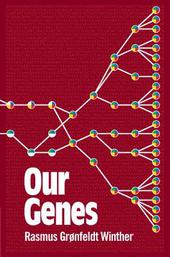
|
Our Genes: A Philosophical Perspective on Human Evolutionary Genomics
Paperback / softback
Main Details
| Title |
Our Genes: A Philosophical Perspective on Human Evolutionary Genomics
|
| Authors and Contributors |
By (author) Rasmus Gronfeldt Winther
|
| Physical Properties |
| Format:Paperback / softback | | Pages:394 | | Dimensions(mm): Height 228,Width 151 |
|
| Category/Genre | Philosophy of science
Popular science
Bio-ethics
Genetics (non-medical)
Human biology |
|---|
| ISBN/Barcode |
9781316621509
|
| Classifications | Dewey:599.935 |
|---|
| Audience | | General | | Tertiary Education (US: College) | |
|---|
|
Publishing Details |
| Publisher |
Cambridge University Press
|
| Imprint |
Cambridge University Press
|
| Publication Date |
22 December 2022 |
| Publication Country |
United Kingdom
|
Description
Situated at the intersection of natural science and philosophy, Our Genes explores historical practices, investigates current trends, and imagines future work in genetic research to answer persistent, political questions about human diversity. Readers are guided through fascinating thought experiments, complex measures and metrics, fundamental evolutionary patterns, and in-depth treatment of exciting case studies. The work culminates in a philosophical rationale, based on scientific evidence, for a moderate position about the explanatory power of genes that is often left unarticulated. Simply put, human evolutionary genomics - our genes - can tell us much about who we are as individuals and as collectives. However, while they convey scientific certainty in the popular imagination, genes cannot answer some of our most important questions. Alternating between an up-close and a zoomed-out focus on genes and genomes, individuals and collectives, species and populations, Our Genes argues that the answers we seek point to rich, necessary work ahead.
Author Biography
Rasmus Gronfeldt Winther is a philosopher of science, researcher, writer, educator, diver, and explorer. He is Professor of Humanities at University of California, Santa Cruz and Affiliate Professor of Transformative Science at the GLOBE Institute at University of Copenhagen.
Reviews'Winther's book is a synthesis of philosophical perspectives on modern evolutionary genomics, written by one of the few people in the world who have a sufficiently deep understanding of both philosophy and biology to achieve such an undertaking. It is a remarkable tour de force of the philosophy of genomics that should be essential reading for students and scholars interested in the broader implications of human genomic research. But the book will also appeal to a more general audience interested in understanding genetics and in finding out what genetics and evolutionary biology can, and cannot, tell them about the fundamental question: Who am I?' Rasmus Nielsen, University of California, Berkeley, USA 'Our Genes makes a significant and welcome contribution! Race theorists seeking to reconcile humanities training and impulses with the insights of contemporary genomics will find Winther's rigorous but accessible study particularly valuable. This is vital work.' Paul C. Taylor, Vanderbilt University, USA 'It's a rare book indeed in which someone from another discipline examines the basic suppositions and habits of thought characteristic of one's own field with equal parts inspiration and care such that it gives you a whole new perspective on what you do and why. Rasmus Winther's Our Genes is one such book. It is a seamless alloy of evolution, genetics, and the philosophy of biology in which each topic is explained in a manner accessible to non-experts. It also subjects these ideas to deep examination and cogent criticism with pressing implications both for how philosophers should approach problems in population genetics and how population geneticists might sharpen their questions. It should be widely and closely read in philosophy and population genetics seminars alike and could well form the foundation for a new generation of fruitful collaborations between philosophers and population geneticists.' Charles S. Roseman, University of Illinois Urbana-Champaign, USA 'Our Genes isn't the last word, it's the first words you should read on the population genetics, molecular genetics, and gene/environment interaction that shaped Homo sapiens over the last several hundred thousand years. Rasmus Winther has produced a tour de force of scientific synthesis, and philosophical analysis, and wisdom about the uses of both.' Alex Rosenberg, Duke University, USA
|